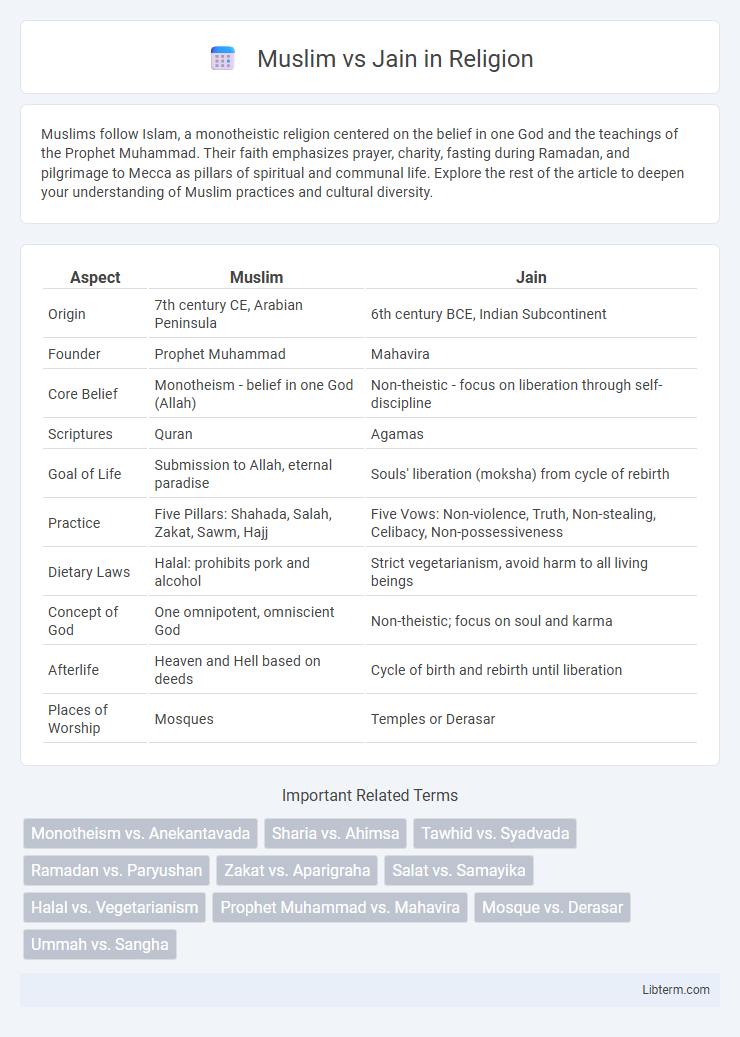Muslims follow Islam, a monotheistic religion centered on the belief in one God and the teachings of the Prophet Muhammad. Their faith emphasizes prayer, charity, fasting during Ramadan, and pilgrimage to Mecca as pillars of spiritual and communal life. Explore the rest of the article to deepen your understanding of Muslim practices and cultural diversity.
Table of Comparison
| Aspect | Muslim | Jain |
|---|---|---|
| Origin | 7th century CE, Arabian Peninsula | 6th century BCE, Indian Subcontinent |
| Founder | Prophet Muhammad | Mahavira |
| Core Belief | Monotheism - belief in one God (Allah) | Non-theistic - focus on liberation through self-discipline |
| Scriptures | Quran | Agamas |
| Goal of Life | Submission to Allah, eternal paradise | Souls' liberation (moksha) from cycle of rebirth |
| Practice | Five Pillars: Shahada, Salah, Zakat, Sawm, Hajj | Five Vows: Non-violence, Truth, Non-stealing, Celibacy, Non-possessiveness |
| Dietary Laws | Halal: prohibits pork and alcohol | Strict vegetarianism, avoid harm to all living beings |
| Concept of God | One omnipotent, omniscient God | Non-theistic; focus on soul and karma |
| Afterlife | Heaven and Hell based on deeds | Cycle of birth and rebirth until liberation |
| Places of Worship | Mosques | Temples or Derasar |
Introduction: Understanding Muslim and Jain Identities
Muslim identity is rooted in the monotheistic Abrahamic faith of Islam, emphasizing belief in Allah and the Prophet Muhammad as the final messenger, shaping cultural and religious practices worldwide. Jain identity centers on ancient Indian traditions emphasizing non-violence (ahimsa), truth (satya), and asceticism, with followers striving for spiritual liberation through strict ethical conduct. Both communities maintain distinct religious texts, rituals, and social structures that define their unique cultural heritages and worldviews.
Historical Origins and Key Figures
Islam originated in the 7th century CE in Mecca, founded by the Prophet Muhammad, who is regarded as the final messenger of Allah in Islamic tradition. Jainism, dating back to the 6th century BCE in India, was established by Mahavira, the 24th Tirthankara, who revitalized the teachings of non-violence and asceticism. Both religions emerged in South Asia but differ profoundly in their theological foundations and historical development.
Core Beliefs and Philosophical Foundations
Muslim core beliefs revolve around monotheism (Tawhid), the prophethood of Muhammad, and the Five Pillars of Islam, emphasizing submission to Allah and accountability on the Day of Judgment. Jain philosophy centers on non-violence (Ahimsa), truth (Satya), and the liberation of the soul (moksha) through strict ethical discipline and self-restraint. While Islam prioritizes divine revelation and obedience to God's will, Jainism emphasizes individual spiritual purity and karma's role in achieving liberation.
Worship Practices and Rituals
Muslim worship centers on the Five Pillars, including daily Salah prayers facing Mecca, fasting during Ramadan, and the Hajj pilgrimage to Mecca, emphasizing monotheism and submission to Allah. Jain worship involves rituals like Pujas, meditation, and periodic fasting, focusing on self-purification, non-violence (Ahimsa), and reverence for Tirthankaras as spiritual teachers. While Muslims gather in mosques for congregational prayers, Jains often worship in temples adorned with idols, reflecting their distinct spiritual approaches and ritual symbolism.
Sacred Texts and Religious Literature
The Quran serves as the central sacred text for Muslims, considered the literal word of God revealed to Prophet Muhammad, while the Hadith collections provide important records of his sayings and actions. Jainism's religious literature centers on the Agamas, scriptures that encapsulate the teachings of Lord Mahavira and the principles of non-violence and asceticism. Both traditions emphasize scriptural study, yet Muslim texts are primarily monotheistic revelations whereas Jain texts focus on ethical conduct and spiritual liberation through self-discipline.
Dietary Laws and Lifestyle Ethics
Muslim dietary laws strictly prohibit pork and mandate halal slaughtering methods for meat consumption, emphasizing cleanliness and ritual purity in food preparation, while Jainism enforces strict vegetarianism, avoiding root vegetables to prevent harm to microorganisms and practicing ahimsa (non-violence) as a core ethical principle. Both religions influence daily lifestyle ethics, with Islam advocating modesty, regular prayer, and fasting during Ramadan, and Jainism emphasizing non-possession, truthfulness, and fasting to purify the soul. These dietary and ethical codes reflect deep spiritual commitments that shape community behavior and individual conduct.
Festivals and Major Religious Observances
Muslim festivals such as Eid al-Fitr and Eid al-Adha are marked by communal prayers, fasting, and charitable giving, reflecting the pillars of Islam. Jain festivals like Paryushana and Mahavir Jayanti emphasize fasting, meditation, and non-violence, celebrating spiritual purification and the life of Lord Mahavira. Both religions observe their festivals with rituals that reinforce faith, community, and devotion, yet their practices and theological focus distinctly differ.
Attitudes Toward Non-Violence and Tolerance
Muslims emphasize compassion and mercy, promoting peaceful coexistence while permitting self-defense within Islamic teachings. Jains strictly adhere to ahimsa, the principle of non-violence, avoiding harm to all living beings and practicing tolerance through non-injury in thought, word, and deed. Both faiths advocate tolerance, yet Jainism's rigorous commitment to non-violence is more absolute compared to the pragmatic approach found in Islam.
Social Structure and Community Life
Muslim social structure is often organized around the ummah, emphasizing communal worship, family ties, and the role of religious leaders like imams in guiding community life. Jain society is traditionally divided into distinct castes, with a strong focus on non-violence (ahimsa) and asceticism influencing daily interactions and social duties. Both communities maintain tight-knit social bonds, yet Jainism's emphasis on strict ethical living contrasts with Islam's structured religious jurisprudence shaping communal norms.
Contemporary Issues and Interfaith Relations
Muslim and Jain communities navigate contemporary issues such as religious pluralism, social justice, and minority rights within multicultural societies. Interfaith relations between Muslims and Jains emphasize dialogue, mutual respect, and collaboration on shared ethical values like non-violence and charity. Both groups often engage in initiatives promoting peace, understanding, and coexistence amidst challenges related to secularism and religious identity.
Muslim Infographic

 libterm.com
libterm.com